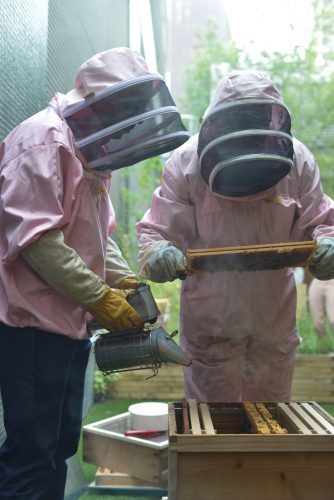“If the bee disappeared off the surface of the globe then Man would only have 4 years of life left” – Albert Einstein.
LCC is now home to 20,000 bees.
Bees contribute to a third of the food we put on our tables. This astonishing figure highlights how very dependent we are on bees. But bees are dying out – and nobody really knows why. We’re doing our bit to help and promote the well-being of the fascinating insects as thousands of bees are welcomed to hives at both LCC and sister College, London College of Fashion (LCF).
Bees at LCC
LCC’s bee hive is located in the corner of the Media Block patio (next to the photography studios) and is populated with 20,000 bees. LCC’s bees have only just arrived and need a month or two to settle in and acclimatise, but are being closely looked after by Project Coordinator Luke Wolski.
Bees at LCF
LCF’s latest bee colony is located on the roof terrace at the John Prince’s Street (JPS) site . Staff and students will be taking up beekeeping duties again, starting at lunchtime on Friday 21 July, by setting up a small planted area on the roof terrace to provide some nearby food for them. There are also bee hives at LCF’s Curtain Road and Lime Grove sites.

Did you know…
- Honey bees communicate with each other through a dance
- A single hive can contain 45,000 bees
- Honey bees are cold-blooded insects that can regulate their own temperature
- Without bees we would fail to produce a vast amount of fruits and vegetables.
- All bees contribute £400 million to the economy
- If UAL students and staff want to find out more about the hives or get involved in the project, get in touch with Project Coordinator Luke Wolski at lccbees@arts.ac.uk
- If UAL students and staff are interested in getting involved with beekeeping or gardening at London College of Fashion, contact Sustainability Coordinator Rosemary Willatt at r.willat@fashion.arts.ac.uk


